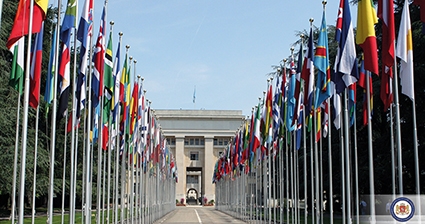Georgia, Russia Cannot Agree on Key Issues despite 10 Years of Geneva Int’l Discussions
Georgia and Russia are still unable to reach agreement on key issues of the Geneva International Discussions (GID), 10 years after the creation of the format.
During the 45th round of the GID, held in Geneva on October 9-10, the ten years’ work of the meetings was summed up and the importance of the discussions highlighted by the participants.
The GID was established after the August 2008 Russia-Georgia military conflict in order to stabilize the situation and implement the August 12 ceasefire agreement between the two countries.
The discussions, which represent the only format of an ongoing international dialogue between Georgia and Russia, are usually held with the co-Chairmanship of the EU, UN and OSCE, and with the participation of Georgia, the Russian Federation and the USA. The representatives of Georgia’s breakaway regions, the Sokhumi and Tskhinvali occupation regimes, also attend the working group sessions.
The talks are usually held within a two meeting-group format. At one meeting, the sides discuss security and stability issues in Georgia’s breakaway Abkhazia and Tskhinvali regions, while the second meeting concerns the dignified and safe return of Internally Displaced Persons (IDPs) and refugees to their homes in the occupied regions.
Georgia’s Ministry of Foreign Affairs (MFA) reports that, “as usual,” the Russian and occupation regimes left the second part of the talks in protest.
The MFA says that representatives of the US, European Union Monitoring Mission and of Georgia noted that the Russian Federation grossly violates the EU ceasefire agreement of 12 August 2008 and urged Moscow to fully fulfill its international obligations, including the withdrawal of occupation forces from the territory of Georgia.
“In this context, the Russian military presence in breakaway Abkhazia and Tskhinvali regions, their frequent military exercises and violations of Georgian airspace have been condemned, which is aimed at further destabilizing the situation on the ground,” the ministry added.
Among the top issues of the talks were the killings of Georgian citizens Archil Tatunashvili in breakaway S. Ossetia, who received 100 injuries prior to his death, of Giga Otkhozoria in May 2016, and of Davit Basharuli, murdered in unclear circumstances in breakaway Tskhinvali in 2015. The sides were encouraged to continue exchanging information on the three cases.
Deputy Minister of Foreign Affairs of Georgia, David Dondua, says the sides stated that the Incident Prevention and Response Mechanism (IPRM) meetings in Gali and Ergneti, which have not been successful of late, need to be continued.
“Everyone recognizes that the Ergneti and Gali mechanisms are important and should be maintained… Today, both mechanisms are under threat. One of the main topics of discussion was that all of us should do our best to get back to the negotiating table because this is the most important component that contributes to the relative stability of the site,” Dondua stated.
Russian Deputy Foreign Minister, Grigory Karasin, also said that the IPRM meetings are important.
“These mechanisms are products of the GID…They should continue as, more or less, they have been working well,” the diplomat stated.
In addition, Karasin expressed concern about the Georgia-NATO joint military drills to be held in March 2019.
“Russia will spare no effort to safeguard borders during preparations for the Georgia-NATO joint exercise…We will appropriately respond to that massive exercise, as it is being held near our borders…Naturally, we will be taking precautionary steps,” he told media outlet TASS.
The Russian Deputy Foreign Minister added that a joint statement on the non-use of force is unlikely to be signed by all participants in the Geneva Discussions on security and stability in the South Caucasus, as Georgia is focused on its presidential elections this month.
"We have agreed to continue discussions on this issue. Perhaps the work will move more easily in December when the next round of discussions is held…We’ll see. It will depend on the outcome of Georgia’s presidential election," he noted.
The next round of Geneva International Discussions will take place on December 11-12.
By Thea Morrison
Photo source: MFA












